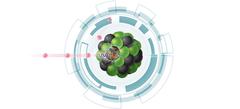The EIC would follow in the footsteps of DESY's HERA accelerator. Image: NAS
The German Research Foundation (DFG) has approved a new research group in the field of theoretical hadron physics. Hadrons are particles made up of quarks. The research team consists of eleven scientists from the universities of Hamburg, Regensburg, Tübingen and from DESY. The speaker is Vladimir Braun from the Institute for Theoretical Physics at the University of Regensburg. The research group FOR 2926 "Next Generation Perturbative QCD for Hadron Structure: Preparing for the Electron-Ion Collider" will initially receive funding of some two million euros for three years. At DESY, Markus Diehl from the theory group is a member of the research team.
The research programme focuses on a new generation of theoretical studies to elucidate the structure of strongly interacting particles, hadrons. The focus is on the precise description of scattering processes in quantum chromodynamics. This theory describes the interactions of the fundamental building blocks of atomic nuclei, quarks and gluons.
A central goal of the research group is to summarise the theoretical basis for the scientific programme of a particle accelerator planned in the USA, the "Electron-Ion-Collider" (EIC). This accelerator will be used in particular to study the spatial distribution of quarks and gluons in a proton and in atomic nuclei. The experiments at the electron-proton collider HERA at DESY have laid the foundations for this programme. The insights gained within the research group will also be useful for the interpretation of data taken at CERN's Large Hadron Collider (LHC).








